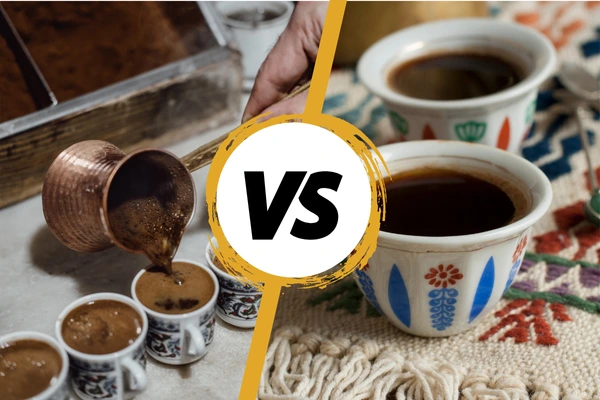Arabic coffee vs Turkish coffee is a comparison many coffee lovers eventually stumble upon. At first glance, they look almost identical. Both are brewed unfiltered, both use extra-fine grounds, and both have deep cultural roots. Preparation, ingredients, and brewing style follow a similar script. Yet, when you taste them side by side, the differences are hard to ignore. In this post, we’ll dig into how Arabic coffee vs Turkish coffee truly compare and show the key details that set them apart.
What is Arabic Coffee?
Arabic coffee is a brew made from 100% Arabica beans ground to an ultra-fine powder.
Traditionally, it is prepared in a small copper pot called an ibrik or cezve. The process is simple yet requires attention. You add the coffee to water, stir it once, then place it over heat.
As soon as it reaches the boiling point, you remove it and let the foam settle. The pot goes back on the heat, the coffee rises again, and you repeat this cycle a few times. This slow, careful boiling is what gives Arabic coffee its signature texture and depth of flavor.
What is Turkish Coffee?
Turkish coffee is also made with 100% Arabica beans ground to an ultra-fine powder. The preparation is straightforward and follows a similar principle to Arabic coffee.
You add the coffee to cold water in a cezve, place it over heat, and let it slowly come to a boil. As the foam begins to rise, you remove it from the heat and pour it directly into the cup.
The result is a thick, aromatic brew with the grounds settling at the bottom, ready to be enjoyed in small, strong sips.
Arabic Coffee vs Turkish Coffee – What’s the Difference?
The biggest difference comes down to boiling time. Arabic coffee is boiled for longer, which means it loses the signature foam that Turkish coffee is known for.
That extended boiling extracts more flavor, giving Arabic coffee a stronger and sometimes more bitter taste.
Turkish coffee, on the other hand, keeps the boiling brief to preserve a thick layer of foam on top and a slightly smoother profile.
The ingredients and brewing method are almost identical, yet the end results feel different in the cup. If you already have the setup for one style, it’s easy to experiment and see which version you enjoy more.
You may also find interesting: Why Turkish coffee stands out among brewing methods.
Quick Overview of Key Differences
Here is a side-by-side comparison of Arabic coffee vs Turkish coffee.
| Feature | Arabic Coffee | Turkish Coffee |
| Preparation Steps | Add coffee to cold water, stir once, bring to a boil, remove from heat, let foam settle, repeat boiling cycle several times, then pour into a cup. | Add coffee to cold water, stir once, bring to a boil until foam rises, remove from heat, and pour into a cup. |
| Equipment Used | Copper pot (ibrik or cezve), small coffee cups. | Copper pot (cezve), small coffee cups. |
| Brewing Time | Longer, with multiple boil cycles. | Shorter, only one boil cycle. |
| Ingredients | 100% Arabica beans, ultra-fine grind, optional spices like cardamom or saffron. | 100% Arabica beans, ultra-fine grind, optional sugar. |
| Results | Stronger taste, no foam on top, more extracted flavor. | Smoother taste, thick foam layer on top, slightly lighter body. |
Want to know if there is an actual difference between Greek coffee and Turkish coffee? Check out the full breakdown.
Key Takeaways on Arabic Coffee vs Turkish Coffee
While Arabic coffee and Turkish coffee share the same foundation, there are still a few differences. Here is what you should keep in mind:
- Both use 100% Arabica beans ground to a fine powder.
- Arabic coffee involves multiple boil cycles for a stronger taste and no foam.
- Turkish coffee has one boil cycle, a smoother profile, and a thick foam layer.
- Equipment is almost identical, with the cezve/ibrik at the center.
- Flavor differences come mainly from brewing time, not ingredients.
FAQ
Is Arabic coffee stronger than Turkish coffee?
Arabic coffee can have a stronger taste than Turkish coffee because it spends more time boiling. The longer exposure to hot water extracts more flavor, which can make it bolder and sometimes more bitter compared to the smoother profile of Turkish coffee.
Can you make Arabic coffee in a Turkish coffee pot?
Yes. Arabic coffee and Turkish coffee are both traditionally brewed in the same type of pot, known as a cezve or ibrik. If you have one, you can make either style without any problem.
How should you serve Arabic and Turkish coffee?
Both are best served in small cups, poured directly from the pot without filtering. Arabic coffee is often presented alongside dates or sweets, while Turkish coffee is commonly paired with Turkish delight or a small piece of chocolate.

